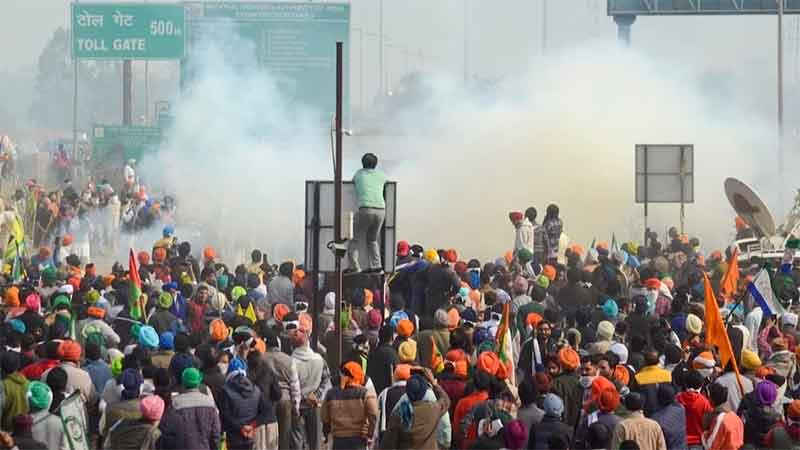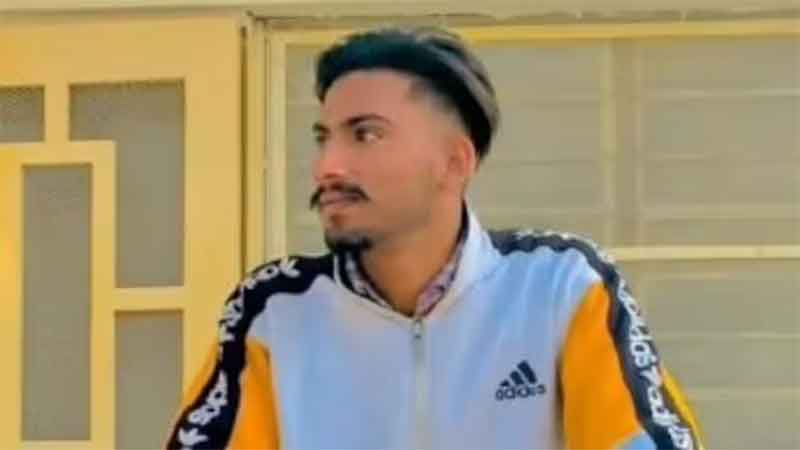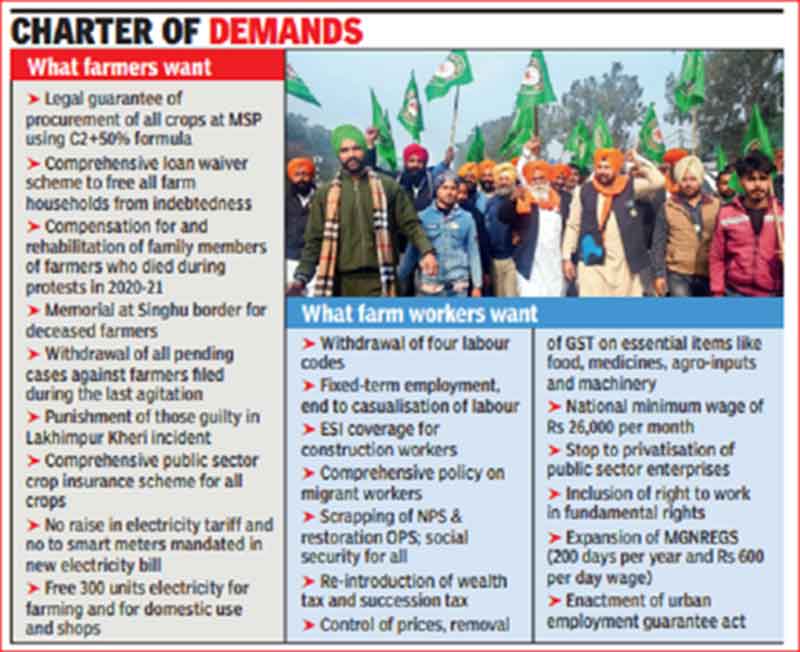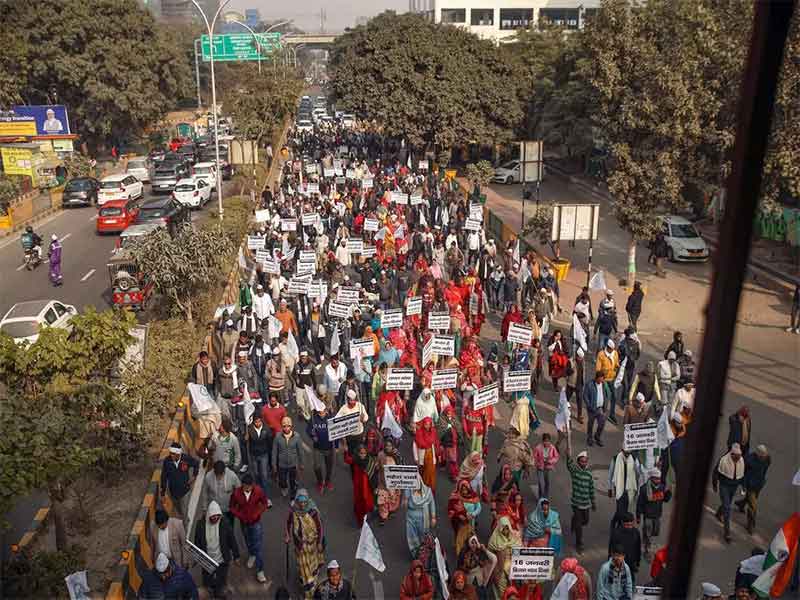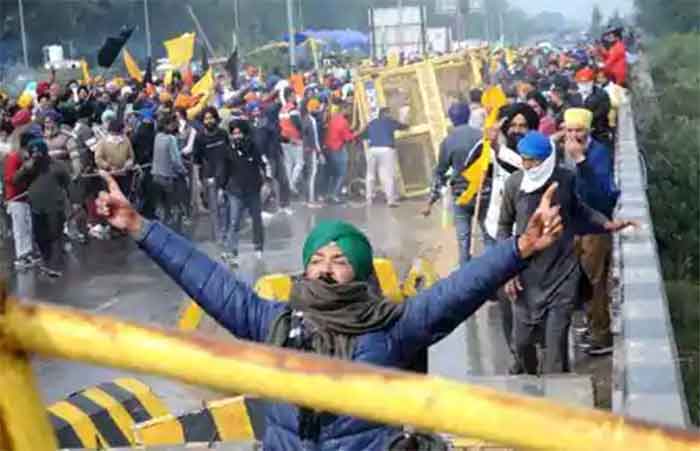
The peasantry of Punjab belonging to 32 different organisations of the All India Kisan Sangharsh Co-ordination Commitee have literally written a new chapter in history after igniting a spark into a Prairie fire. Arguably in the entire world has a farmers movement hit such a crescendo. There is hardly a adjective in the dictionary that can do justice to the extent of intensity or relentless spirit of the peasant agitators. Facing the deepest depths of despair and thwarted by impregnable police barriers they revealed death defying courage of an army. It was not just the vast numbers which climbed over 10 lakh but the great qualitative or electrifying impact it had striking the ruling classes in their very backbone.
CONTRIBUTION OF BKU-EKTA(UGRAHAN)
The greatest credit for galvanisng the combat forces and their crystallisation in such magnitude goes to the Bharatiya Kisan Union(Ugrahan).It galvanised over one and a half lakh people., including around 50000 women alone. More than 50% of the protestors were the youth which was a positive trend. It was a perfect illustration of their surgical mass line practice .It confronted any type of legalism or economism to the core, by sustaining the agitation when other organisations decided to withdraw. Their storming into Delhi reminded one of a surgical operation of an Army batallion,with in depth understanding of the subjective conditions. It created the impact of a tornado in bordering regions of the capital. It has created such a thorn in the flesh for the ruling classes who are now even embarrassed to deploy the police to foil the protest.
It may take a book to describe the most soul searching scenes at Tikri, Singhu, Jharoda, Ghazipur and Chilla, areas at the border of Delhi. The farmers confronted the teargassing, water cannons and barricades of the police weathering the chilliest of temperatures, with courage in proportions of Vietcong challenging the might of America in the Vietnam war. It was reminiscent of a boulder weathering the most turbulent of storms or gales. It set up Langars, established base camps, raised slogans waved flags and pounded tractors in. With the great methodology of an architect or surgeon it chalked out strategic points to agitate.
Significant solidarity was initiated by the Punjab Students Union (Shaheed Randhawa),Nauawan Bharat Sabha and Punjab Khet Mazdoor Union.It speaks volumes of the painstaking class -mass work to sharpen essence of revolutionary democratic politics has been undertaken at the very base. I would compare this effort of Ugrahan group with the bests ever mass organised protests of the poor peasantry in world history. I apologise if I am being partial but most intellectuals have failed to portray the distinguishing features of the Ugrahan group in this development.
Speeches were continuously made highlighting how the agricultural bills were morally neo-fascist and destroy to dust any democratic aspirations of the peasantry. In depth they summarized how it gave Corporates a licence to plunder the peasantry by having a total monopoly in dictating prices or obtaining land. The speakers elaborated how now the Corpoaraes had a complete monopoly over the public distribution system and thus morally were a far greater menace to the peasantry than the traditional middlemen.
The speakers stated that the dominance of corporate houses in agriculture sector meant the complete tarnishing of public distribution system. The new sytem would l ensure profit for the corporate houses and imperialist multinational corporations by depriving people of essential commodities. The new system would also increase black marketing and artificial glut and scarcity in the market. The leaders stated that this agitation was an attempt to save a profession like agriculture and to ensure food security of the masses. This is the reason that the agitation is getting support from people across the country and different walks of life.
The connivance of opposition parties be it the Congress or Aam Admi party or Akali Dal was exposed in no uncertain terms explaining that their economic policies were an integral part of the semi-feudal,semi-colonial state and thus in essence not different from the Bharatiya Janata Party. However still the main attack was on the Narendra Modi led Bhartiya Janata party illustrating how it blessed imperialism at crescendo never reached before or patronizing corporates more than any ruling party ever did in India. The expression on the faces of the peasantry was the very writing on the wall on the semi-slavery they were subjected to. The relevance of a broad united front of al democratic classes was brought to the fore. The manner reinforcements are sent reminding one of how a great army replenishes its forces.
In recent days it even highlighted how Industrial families were seizing Panchayat land and violating the Punjab Village Common land rule of 1964.They narrated how the state has about one and a half lakh acres of panchayat land and their contracts and make crores of income with the government’s eye now on these lands. The intention of looting the prices of panchayat lands is a direct raid on the interests and rights of the poor farmers. Whose interests are in farming on these lands
CONTRIBUTION OF OTHER DEMOCRATIC FORCES
I also applaud the heroic role of the Kirti Kisan Union and the Naujwan Bharat Sabha who most qualitatively shimmered the spark of resistance and also mobilised a significant dalit landless labour section. Around 20,000 participated from Kirti Kisan Union who placed accent on the fascist rule unleashed by the centre and how it was empowering itself to crush all federal status of Punjabi people. In recent days some very notable work has been undertaken by the Punjab Students Union in solidarity and consolidation .Many convoys of Punjab Students Union are on their way to Delhi .No organisation shave mobilsed the Dalit agricultural labour Community as these forces.
The Bhartiya Kisan Union(Dakaunda)) has too risen to the hour significantly.
Sadly some important leaders of Kirti Kisan Union accused the Bharatiya Kisan Union(Ugrahan) of sabotaging the movement projecting is as trying to promote it’s own image and violating the collective spirit. This was countered by many intellectuals and refuted by Urgahan activists themselves who explained that only by prolonging resistance can any revolutionary alternative path be paved. Even an ex- cadre from their camp to the core was critical of the comments of Comrades Sardara Singh Mahil and Rajinder .Publicly such leaders expressed that the BKU(Ugrahan) hosting a langar at the initial stages near the border was derogatory. However the Ugrahan group gave no counter statement in light that it would cause friction amongst the participants.
Almost every day interviews were carried out with Joginder Singh Ugrahan ,the president of the BKU.
REPORTS OF IMPORTANT PROTESTS IN DELHI MOVEMENT
On 4th December BKU (Ekta Ugrahan) continued its protest at Tikri border where protesters have occupied kilometres of road and established five stages to address the gatherings. Shingara Singh Mann, Jaswinder Singh Soma, Harinder Kaur Bindu, Paramjit Kaur Pitho, Zora Singh Nasrali of Punjab Khet Mazdoor union, Amolak Singh of PLS Manch, Amitoz Singh Maur of Punjab student union (Shaheed Randhawa), Sushil Kumari, Rajesh Dhankar, Mukesh Khasa and Khushbir Kaur from Haryana addressed the gathering. The speakers explained that Modi government Is responsible for the discomfort of the local community is facing due to ongoing agitation. It was reiterated that this is an agitation for the security of the farmer as well as the food security of the country.(Sukhdev Khokri)
The speakers stated that the dominance of corporate houses in agriculture sector mean end of public distribution system. New system will ensure profit for the corporate houses and imperialist multinational corporations by depriving people of essential commodities. The new system will increase black marketing and artificial glut and scarcity in the market. The leaders stated that this agitation is an attempt to save a profession like agriculture and to ensure food security of the masses. This is the reason that the agitation is getting support from people across the country and different walks of life. The speakers appealed to the residents of Delhi that they should take the purpose of agitation into account while facing the problems caused by it. While appreciating the cooperation extended by the local community the speakers asked for more support from the capital city.(Information from Sukhdev Khokri)
A play, Superpower was performed along with choreographies by PALS Manch. Jagsir Singh Jida and his Lok Sangeet Mandali Jida performed in their typical style. Ajmer Singh Akalia presented revolutionary songs on the occasion.
On 4th December BKU (Ekta-Ugrahan) has named five protest sites after the names of historical personalities representing the legacy of struggles leading up to the ongoing agitation against farm Bills passed by the Modi government.
The protest site spread over kilometres have been divided into cities named after these personalities – Baba Banda Singh Nagar, Chacha Ajit Singh Nagar, Bibi Gulab Kaur Nagar, Shaheed Bhagat Singh Nagar and Shaheed Sadhu Singh Takhtupura Nagar.
Union’s state secretary Shingara Singh Mann and Wome leader Harinder singh Bindu said that these cities have been settled on the names of the heroes of our fighter heritage. They told that this city was settled in the name of Baba Banda Singh Bahadur, Uncle Ajit Singh, Gadri Gulab Kaur, Shaheed Bhagat Singh and Shaheed Sadhu Singh Takhtupura.
Shingara Singh Mann e said that a press gallery has also been installed in the name of Shaheed Ashfaq Ula Khan to provide information to the press in the ongoing front. He said that Baba Banda Singh Bahadur is the hero of the great rebellion of the farmer who has made the farmers own the lands with the strength of long and slowing down. He said that uncle Ajit Singh is the leader of the Jatt movement to take care of the Shanamati turban against the British government which is still a light torch for the farmers fighting for their rights. He said that Gadri Gulab Kaur is the heroine fighting against the colonial government who is fighting for his rights and is a light for the women in the Delhi front.
He said that Shaheed Bhagat Singh is the great martyrs of the National Liberation Movement who first presented the program of the British government as well as the elimination of the loot of indigenous robbers for the freedom of farmers, labourers, youth and countrymen. । He said that Shaheed Bhagat Singh is still a great hero who made the heartbeat of farmers, laborers, women and youth who struggle to get rid of loot. He said that Shaheed Sadhu Singh Takhtupura is the hero of the current Kisan Movement who has been important in giving the form of a huge movement to our organization and the farmer movement by drinking the jam of martyrdom against the government-sponsored Bhau Mafia during the Akali BJP rule. Played the role.
Farmer leaders said that the towns, named after these heroes of their great fighter heritage, are the symbol of the narrow element of the Kisan Movement, whose roots are in the great heritage of the country’s secular and democratic traditions. । He said that the city is also a symbol of the strong intentions of farmers, labourers, youth and women who stand against agriculture laws that they will return home after returning the five laws..
The leaders explained that the sites named after these legendary personalities manifest the progressive and secular character of the ongoing agitation against farm laws. The ongoing movement is in continuity with the glorious history created by struggling masses and that history inspires farmers, workers, women and youth to struggle against the injustice, they said.The duo remained confident that the ongoing movement would carry the people’s history forward and emerge victorious.(Tribune News )
On 5th December BKU Ekta Ugrahan embarrassed the Modi Govt at its boiling point at six places and more than 500 districts in Punjab in Delhi Kisan Morcha.
Gathering together Shingara Singh Mann, Harinder Kaur Bindu, Paramjit Kaur Pitho, Amarjit Singh Saidoke, Jaswant Singh Tolewal, Puran Singh Doda, Manjit Singh Niyal, Gurpreet Singh Noorpura, Jora Singh Nasrali, Amolak Singh, Rajasthan leader Santvir Singh Mohanpura Haryana Teke Ram Narnol, Manjeet Julka, Om Prakash Rathi, Joginder Kathota Sarv Employees Association Haryana, Munisa Student Ekta Manch Haryana, Chandigarh, Young Student Amrit Kaur, Leader of Five Member Kisan Sangharsh Committee Gurbaz Singh.
Shingara Singh Mann said expressing solidarity on the invitation of all farmer organizations in the country that the BKU unity will also take a strong participation. Invitation to the different workers of the society to connect their leaders with this solution. Addressing them especially to the Dalit community and farm workers, they said that they should be a big part of the society in support of the movement of the labor stage and give a strong reply to the politics of the BJP which is distributing caste distribution. He said that shopkeepers and small businessmen who are being oppressed by the FDI and GST should raise a joint voice to dismiss these people’s killing policies. In the same way, this day should be made a joint voice of people of every stage including the workers, employees, students.
SOLIDARITY PROTESTS IN PUNJAB
In solidarity in Punjab to illuminate spark of the agitation in over dozen places in Punjab solidarity rallies have been launched or cultural programmes.
On Decmber 3rd on invitation of the Kirti Kisan Union, the leader of the Rural Labor Union Hariram Rasulpuri, Mata Gujri Women’s Chetna Committee, was held in support of the historic farmer’s struggle in the country at village Mehmudpur (District Shaheed Bhagat Singh Nagar). Addressed by Mehmudpur President Madam Kulwant Kaur, Secretary Ranjit Kaur and Press Secretary of Democratic Rights Sabha Punjab Buta Singh. Bawa Singh Atwal, the leader of Kirti Kisan Union and rational leader Ninderpal Maidita were also present on this occasion. The people of the village responded to the invitation of Jago with so much enthusiasm that more than 200 villagers including young people, children and women joined. And for two hours in the village, the slogans of Modi government Murdabad, Farmer’s struggle Zindabad, Labor-Farmer unity Zindabad were echoed. Demanding the abolition of anti-people agriculture laws and opposing the dictatorial decisions of the fascist Modi government, the villagers were invited to reach the maximum number of protests in Nawanshahr on December 4.
On December 5th effigies of the Modi govt.were burnt in Rasulpura , Mehamudpur and Kahma.
At Chandigarh Road on December 4th Kirti Kisan Union undertook a major solidarity action in support of the Farmer Morcha organized in Delhi on December 8, Nawanshahr announced to close the district Nawanshahr on Langdoa Bypass on December 8. In the meeting, Auto Workers Union, Tempu Union, Taxi Union, Women Jagriti Manch, Indian Federation of Trade Unions, Kirti Kisan Union, Rehri Workers Union, Migrant Labor Union, Bhatha Workers Union, Dr. Ambedkar Mission Society, Rural Labor Union, Medical Practitioners Association, Democratic Teachers Front, Punjab Students Union, Sikh Organizations, Social Organizations, Leaders of Cooperative Meeting, Traders and Panchayat Representatives attended. Representatives have announced to make this closure a success with an opinion. Kirti Kisan Union Nawanshahr leader Tarsem Bains Iftu state president Kulwinder Singh Waraich, Jasbir Deep, Buta Singh of the Democratic Legislative Assembly, said that people are protesting against the central government’s agriculture laws, electricity bill 2020.
On December 2nd in Bathinda city, the Farmers Struggle Support Committee conducted a huge torch march in the city in support of the farmers sitting in Delhi. The number of 4-500 mobilised comprised of 100 women, of whom 80 % were teachers. The projection of the slogans was contentful and the enthusiasm and rally completely effective.
Funds were also given by the shopkeepers from the same market.
SUPPORT TO FARMERS PROTEST AND MOST POSITIVE HAPPENINGS.
Arguably never in Indian history has the base of Hindutva neo-fascism been given such a striking blow by democratic forces illuminating spark of liberation. There could hardly be a better illustration of the peasantry to establish its own striking power or how in essence the so call neo-liberal economy is model or manifestation of proto-fascism engripping the entire nation.
Major solidarity has been undertaken in states like Andhra Pradesh,Telengana,West Bengal,Bihar,Uttar Pradesh etc.Farmers irganisation have openly intervened from Uttar Pradesh,Haryana ,Madhya Pradesh and Rajasthan
Very impactful solidarity demonstrations were undertaken by workers in industrial areas of Ludhiana.
It is also a significant development that many small traders ,shopkeepers or businessman have supported the struggle and even integrated with it.
The student and youth community most sporadically came out in support of the peasantry which must b welcomed.
One of the most inspiring instances of this agitation was how BKU women leader Harinder Bindu shimmered flame of resistance to mobilize over 10000 women. It paid a fitting a tribute to the valiant effort of the organised movement to make women an integral part of the movement. The morale support of singer Diljit Dosanjh also was most inspirational in an era when most commercial singers turn their back son people’s movements and literally sell themselves like slaves of the culture of imperialism or exploiter classes. I was also most impressed by a University student Hindol Mazumdar from West Bengal openly describing the BKU (Ugrahan) movement as an outstanding one which distinguished itself from economist or sectarian trends. It highlighted how the BKU Ugrahan thwarted leader Jogendra Yadav from making the peasants retreat. Even this is rare today when most revolutionary sympathisers are either absorbed in heroics of Maoist armed squads or neo-Ambedkarist pro-dalit movements. In a small article he narrated the class essence of this struggle.
A most welcome developments has been the support of top sportsman and artists from Punjab wholeheartedly supporting the farmers struggle and willing to relinquish their awards or medals. This is a very rare occurence in India where top sportsman and artists are sold on making hordes of money and have scant respect for social values. Such a phenomena is a vitally lacking ingredient in the Indian democratic movement today.
Gatherings were also addressed by young film Saj Jatinder Mahar, renowned Rangkarmi Samuel John, student Vijay Dhankhar teacher leader Haryana.
On this occasion, plays were played by Manavata Kala Manch Nagar (plus stage) and revolutionary songs were presented by Jagsir Jida, Ajmer Singh Aklian and Nargis.
The leaders of this struggle are not willing to sit on the negotiation table after even the fifth talk and have boldly declared a bandh on December 8th.They find the Govt.solutions or amendments futile after 5 successive rounds of talks ending in a stalemate.
A most welcome development has been the support of top sportsman and artists from Punjab wholeheartedly supporting the farmers struggle and willing to relinquish their awards or medals. This is a very rare occurrence in India where top sportsman and artists are sold on making hordes of money and have scant respect for social values. Such a phenomena is a vitally lacking ingredient in the Indian democratic movement today.
On December 4th Hundreds of students, Women’s Rights leaders, industrial workers and intellectuals of Delhi rallied today at Jantar Mantar to protest against the Govt. of India’s callous attitude towards the just demands of the Farmers. They were stopped and heckled by the Delhi police, but they held their ground and continued with their meeting, where leaders expressed their anger firstly the repression and hurdles placed on the march of the Punjab & Haryana farmers, then the failure to address their main concern and now the repression that has begun by giving Police Notices and preventing protests.
All over the nation organisation sare boycotting toll plazas supporting the peasant protest.
Above all whatever differences the basic unity of the agitation against the bills has not been broken which is most heartening.
WHAT STEPS SHOULD BE TAKEN TO CONSOLIDATE AGITATION
What is binding and will intensify this stir is the solidarity from force s outside Punjab and abroad. However one must guard against trends that wish to portray a this uprising as a resurgence of ‘Sikh movement’ confronting the anti-federal dictates of the state or a consolidation of ‘only rich peasantry. ‘Here I remind readers that Sikh or Punjabi people do not comprise a seperate nationality .Tooth and nail we must ofcourse refute those who identify Khalistani politic sin this agitation .The essence of class polarisation must not be diffused here particularly by Ruling class politicians fostering Sikh identity sentiment and dividing the movement on communal lines. Leaders must also strike a balance and not become victims of either compromising with ruling class leaders or under estimating subjective forces at crucial junctures.
So far the leaders have shown great political maturity when participating in talks with the rulers .Another crucial aspect is that it should not just reduce the dalit landless labour community into an appendage or cosmetic force but an integral part of the agitation. The working class must also be mobilized in tandem with the peasantry, highlighting its relationship with their day to day lives or class struggles. I have never witnessed an agitation which has harnessed support from such a wide range of sections.
It is important that democratic forces all around the nation are galvanised in support to form a broad spectrum and that every oppressed or democratic section must form separate platforms in support be it students, teachers, govt.employees or doctors. It should also be connected to the secular democratic revolutionary resistance to Hindutva fascism as a whole with an acute connection made between Hindutva ideolgy and patronage to classes of Corporates and big landlords.
A protracted effort must be made to sharpen revolutionary class politics sand make peasantry demarcate from the ruling class ideology which in essence only divides the rich and mighty. It is also important that caste politics does not intervene to divide the agitation and even Ambedkarites come out in full support.It is important that Communist revolutionaries do not claw the agitators with their political line and pursue a patient, painstaking approach to educate the peasantry.
It can also develop in a platform to demarcate from the revisionist or reformist policies of the Communist Party of India and the Communist Party of India(Marxist) and win over m any cadres belonging to peasant unions of those parties.
In my view however acute is the contradiction with feudalism such a development testifies the role or impact of imperialism in determining feudalism and how in regions like Punjab feudalism may not be the principal contradiction.
It is also of vital importance that polemical issues do not break the fundamental unity of the organisations, which would splinter the movement. Sharp demarcation must be made of electoral politics which in the past has often induced parliamentary tailism by democratic peasant forces.
A most important contribution will be a report on the agitation by Punjabi revolutionary journal ‘Surkh Leeh’. It should be propagated very widely in all circles with it’s incisive revolutionary democratic analysis. In in detail is publishing a study on its political significance. For politically advanced leftsis sections the statement of the Communist Party Re-Organisation Centre of India (Marxist-Leninist) when it is published which would be of great relevance in connecting this agitation with the interest of the agrarian revolutionary movement as a whole
I thank the inputs or reports from BKU(Ugrahan) secretary Sukhdev Singh Khokri , Surkh Leeh editor Pavel Kussa ,Rupinder Chaunda of Naujwan Bharat Sabha ,ShingarSingh Mann of BKU (Ugrahan) as well as from Kisan Morcha and Delhi Kisan Morcha.
Harsh Thakor is a political commentator
SIGN UP FOR COUNTERCURRENTS DAILY NEWSLETTER

